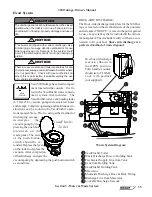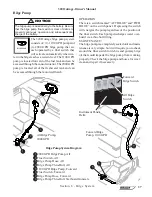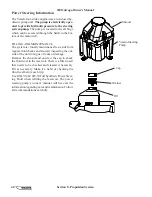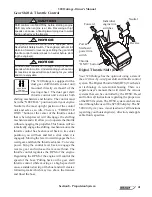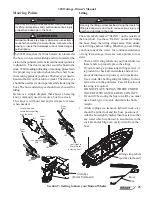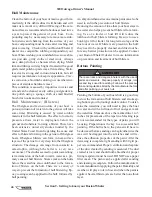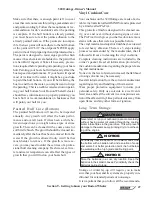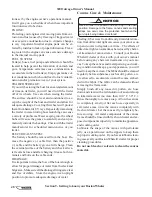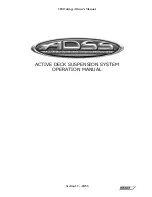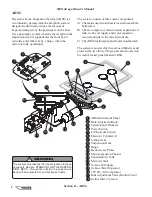
48
Section 9 - Getting to know your Boston Whaler
320 Outrage-Owner’s Manual
tions set by the engine owner’s operations manual.
It will give you a schedule of when these important
functions need to be done.
ENGINE:
Protecting your engines vital moving parts from cor-
rosion and rust caused by freezing of trapped water
or excessive condensation due to climatic changes
is very important. Internal engine parts can be ef-
fected by rust due to lack of proper lubrication. Freez-
ing water in the engine can cause extensive damage
to the internal moving parts.
FUEL SYSTEM:
Tank(s), hoses, fuel pump and carburetor should be
treated to help pevent the formation of varnish and
gum. Temperature extremes cause condensation to
accumulate in the fuel tank(s). Empty gas tanks col-
lect condensation which could lead to fuel contami-
nation and/or premature wear of your system.
TRAILER STORAGE:
If you will be storing the boat for an extended amount
of time on its trailer, you will need to lift the trailer
off of its wheels. Use care when raising the trailer.
The surface should be level and conditioned to ac-
cept the weight of the boat and trailer and allow for
adequate drainage. Covering the wheels will protect
them from harmful UV rays. Repeatedly immersing
the trailer in water during boat launching can cause
a variety of problems. Water seeping into the wheel
hubs will cause the grease to emulsify and can pre-
maturely corrode the bearings. Check with the trailer
manufacturer for scheduled maintenence of you
trailer.
ELECTRICAL SYSTEM:
The battery should be removed from the boat. Re-
move the negative (-) cable first, then the positive
(+) cable and the battery given a full charge. Clean
the external surface of the battery and check all wa-
ter levels before and after charging. Grease both ter-
minals and bolts on the cable ends.
DRAINAGE:
It is important to raise the bow of the boat enough to
allow for proper drainage of water from the deck and
bilge area. Make sure all the drainage fittings are clear
and free of debris. Store the engine in an upright
position to promote adequate drainage of water.
NEVER trailer the boat with the sun-top in the open
position. Damage to the frame, canvas and securing
straps can occur. Use the protective boot when the
sun-top is being trailered or stored.
NOTICE
!
Chafing, fiber wear from dirt and grit and deteriora-
tion from ultraviolet light can cause your canvas sun
top and covers to degrade over time. The effects of
ultraviolet light can sometimes be reduced by chemi-
cal treatment of canvas items. Consult your Boston
Whaler® dealer or check with your owner’s manual
before using any chemical treatments on your can-
vas. To keep the canvas and metal parts in good work-
ing condition and keep a good appearance, you will
need to keep them clean. The fabric should be cleaned
regularly before substances such as dirt, pollen, etc.
are allowed to accumulate on and become embed-
ded in the fabric. The fabric can be cleaned without
removing the framework.
Simply brush off any loose dirt, pollen, etc. hose
down and clean with a mild solution of a natural soap
in lukewarm water (no more than 100 ° F. 38° C.).
Rinse thoroughly to remove soap. Allow the canvas
to completely air-dry. After each use especially in
salt water areas, rinse the canvas completely with
fresh cold water. Let the canvas dry completely be-
fore stowing. All metal components of the canvas
frame should be rinsed with fresh cold water and ex-
posed components wiped dry to maintain appearance
and working order.
Lubricate the snaps of the canvas with petroleum
jelly, use a parafin wax on the zippers to keep them
in proper working order. If you have stubborn clean-
ing cases call your Boston Whaler® dealer for proper
cleaning procedures.
Do not use bleach or solvents to clean the canvas
material.
Canvas Care & Maintenance


